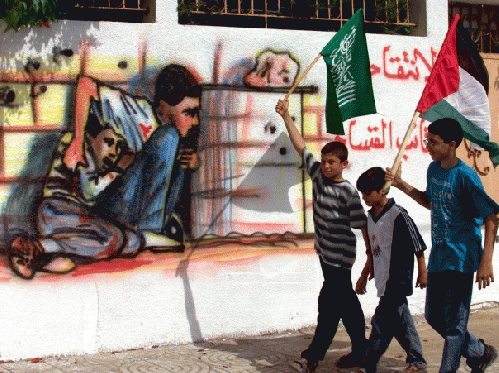Cross-posted from Ramsey Baroud Website

Palestinian boys carrying Hamas and Palestinian flags in the Gaza Strip walk past graffiti showing the death of 12-year old Mohammad al-Durra, who was shot dead during Israeli-Palestinian clashes, in this October 6, 2000 file photo.
(Image by REUTERS/Ahmed Jadallah/Files) Details DMCA
The destruction is overwhelming, and everywhere, Palestinians lament there is nowhere that is safe. Regardless, resolve is strong and the people of Gaza will not resign themselves to surrender.
The resistance movement in Gaza is often misrepresented intentionally at times, and at other times innocuously. In the heat of the information battle that has ensued since Israel unleashed its latest war, many facts and essential context have gone missing.
Historically, Gaza has been a hub for uninterrupted popular resistance since the ethnic cleansing of Palestine at the hands of Zionist militias, and later the Israeli army, in 1947-48. An estimated 200,000 of Palestine's then nearly 800,000 refugees were forced there, with most enduring squalid and humiliating conditions.
These were dispossessed refugees still unaware of the complexity of their political surroundings, and the Fedayeen were mostly young Palestinian refugees fighting to return to their homes. But their operations grew bolder day by day. They would sneak back into their towns -- which then eventually became part of Israel -- with primitive weapons and homemade bombs. They would kill Israeli soldiers, steal their weapons and return with the new weapons the second night.
Some would secretly go back to their villages in Palestine to "steal" food, blankets and whatever money they had failed to retrieve in the rush of war. Those who never returned received the funerals of martyrs, with thousands of fellow refugees marching with symbolic coffins to graveyards. Hundreds never returned and few bodies were ever recovered.
Following every Fedayeen strike, the Israeli army would hit back at Gaza's refugees, inspiring yet more support and recruits for the growing commando movement.
The prowess of those young refugee fighters was on full display in November 1956, when Israel invaded the Gaza Strip and large swathes of Sinai following the Suez Crisis. Egyptians fought the Israeli army with much courage, but the Palestinian garrison based in Khan Younis -- now a major target in the latest Israeli war -- refused to surrender.
When the fighting was over, Israel moved into Khan Younis and carried out what is now etched in the Palestinian collective memory as one of the most horrific mass killings in Gaza's history -- a massacre of 124 men and boys in the Rafah refugee camp known as al-Amiriyah School Massacre.
"The victims were herded into the school under the batons of the soldiers", reflects Dr Ahmed Yousef, in a recent article. "Those who survived the beatings were met with a hail of bullets and the demolition of the building over their heads. The bloodstains stayed on the school walls for years to remind us children of Israel's crime."
Yousef, then a child in a brutalized Rafah, would later become a top adviser to Hamas' first Prime Minister Ismael Haniyeh in Gaza. His article, originally published in Arabic, was entitled: "The resistance will not surrender... we will be victorious or die."
Are there any surprises in how the past is knitted both to Gaza's present and future? It should also be of no surprise that Palestine's mightiest resistance today, the Izz al-Din al-Qassam Brigades, was formed by a small group of school kids in the central Gaza Strip.
These were poor refugees who grew up witnessing the brutality of the occupation, and the abuse it invited into their daily lives. (The group adopted the name of Izz al-Din al-Qassam, an Arab preacher who fought British colonialism and the Zionist forces until he was killed by British forces in a Jenin orchard in 1935.)
The first young men who started al-Qassam were all killed shortly after the inception of their group. But what they started has since become a massive movement of thousands of fighting men and woman which, as this article was being written, were keeping Israeli forces in northern Gaza at bay.
Resistance in Gaza, as in any historical inevitability, can never be interrupted. Successive Israeli governments have tried extreme measures for decades before the so-called Operation Cast Lead of 2008-9.
(Note: You can view every article as one long page if you sign up as an Advocate Member, or higher).




